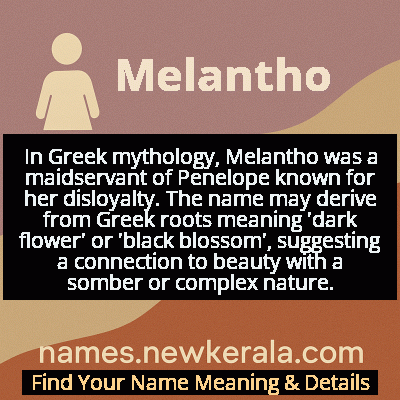Melantho Name Meaning & Details
Origin, Popularity, Numerology Analysis & Name Meaning of Melantho
Discover the origin, meaning, and cultural significance of the name MELANTHO. Delve into its historical roots and explore the lasting impact it has had on communities and traditions.
Name
Melantho
Gender
Female
Origin
Greek
Lucky Number
7
Meaning of the Name - Melantho
In Greek mythology, Melantho was a maidservant of Penelope known for her disloyalty. The name may derive from Greek roots meaning 'dark flower' or 'black blossom', suggesting a connection to beauty with a somber or complex nature.
Melantho - Complete Numerology Analysis
Your Numerology Number
Based on Pythagorean Numerology System
Ruling Planet
Neptune (Ketu)
Positive Nature
Intuitive, analytical, spiritual, and inquisitive.
Negative Traits
Secretive, reserved, aloof, and can be overly critical.
Lucky Colours
Green, yellow.
Lucky Days
Monday.
Lucky Stones
Cat’s eye, moonstone.
Harmony Numbers
1, 5, 6.
Best Suited Professions
Scientists, researchers, spiritual leaders, detectives.
What People Like About You
Depth of knowledge, analytical skills, spirituality.
Famous People Named Melantho
Melantho of Ithaca
Mythological Servant
Featured in Homer's Odyssey as one of Penelope's maids who betrayed her household
Melantho (Nymph)
Mythological Figure
Appears in alternative Greek myths as a minor deity associated with dark flora
Melantho Character
Literary Figure
Inspiration for characters in modern mythological retellings and classical studies
Name Variations & International Equivalents
Click on blue names to explore their detailed meanings. Gray names with will be available soon.
Cultural & Historical Significance
Scholars have interpreted Melantho's character through various lenses: as a victim of circumstance, a symbol of corrupted innocence, or a representation of the moral chaos that ensues when proper social order breaks down. Her name itself carries cultural weight, combining the Greek words for 'black' and 'flower' to create a poetic image that suggests beauty tinged with darkness or danger. This naming convention reflects the Greek tendency to imbue names with symbolic meaning that often foreshadows character destiny. The enduring presence of Melantho in classical studies and modern adaptations demonstrates how even minor mythological figures can offer profound insights into ancient cultural values and continue to resonate across millennia.
Extended Personality Analysis
The name Melantho suggests a personality characterized by depth, complexity, and a certain mysterious elegance. Individuals with this name often possess a natural grace combined with intellectual curiosity and emotional intensity. The mythological association implies someone who may face moral dilemmas or difficult choices, developing resilience and wisdom through challenging experiences. There's typically a strong artistic or creative streak, with an appreciation for beauty in its many forms—whether in art, nature, or human relationships.
Modern bearers of the name often exhibit perceptive social intelligence, able to read situations and people with remarkable accuracy. This can make them excellent judges of character, though it might also lead to cynicism if not balanced with optimism. The 'dark flower' etymology suggests someone comfortable with complexity, who understands that people and situations are rarely purely good or evil. They tend to be independent thinkers, unafraid to explore unconventional ideas or challenge established norms. While they may appear reserved initially, they often reveal deep loyalty to those who earn their trust, embodying the lesson of their mythological namesake in reverse—valuing fidelity precisely because they understand its importance. Their strength lies in their ability to navigate life's shadows while still appreciating its beauty.
Modern Usage & Popularity
In contemporary naming practices, Melantho occupies a unique position as a historically rich but distinctly uncommon choice. The name appeals particularly to parents with interests in classical literature, mythology, or those seeking names with poetic floral meanings that stand apart from more common options like Lily or Rose. While statistical data shows the name remains outside the top 1000 baby names in English-speaking countries, it has gained traction in academic and literary circles where classical names are appreciated. The variation 'Melantha' sees slightly more usage, offering a softened version that maintains the original's elegance while being more accessible to modern ears. Recent years have shown increased interest in mythological names overall, with Melantho benefiting from this trend alongside names like Persephone, Calliope, and Athena. Its rarity ensures distinctiveness while its classical roots provide cultural credibility. The name works well in multicultural contexts and appeals to parents looking for something both meaningful and uncommon, particularly those who value the storytelling potential that comes with a name drawn from epic literature.
Symbolic & Spiritual Meanings
Symbolically, Melantho embodies the rich paradox of beauty emerging from darkness and the complex nature of moral choices. The name's literal meaning—'dark flower'—suggests several layered symbolic interpretations: the idea that true beauty often contains elements of mystery or shadow, that growth can emerge from difficult circumstances, and that appearances can be deceiving. In the context of her mythological story, Melantho symbolizes the consequences of choice and the fragile nature of loyalty. She represents how circumstances can test character and how survival instincts sometimes conflict with moral principles.
Metaphorically, the name evokes night-blooming flowers—those that reveal their beauty in darkness, suggesting hidden strengths and unconventional timing. It also carries the symbolism of the underworld or subconscious, representing aspects of human nature that operate beneath surface appearances. For modern interpretation, Melantho symbolizes the complexity of female agency throughout history—the limited choices available to women in patriarchal systems and the moral compromises sometimes necessary for survival. The name serves as a reminder that human character is rarely simple, that people contain multitudes, and that understanding requires looking beyond superficial judgments to appreciate the full context of someone's choices and circumstances.

